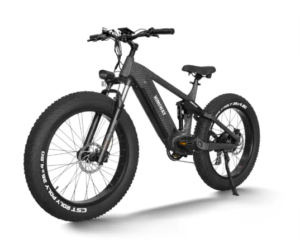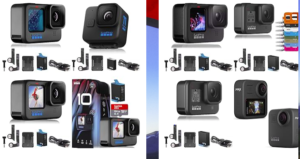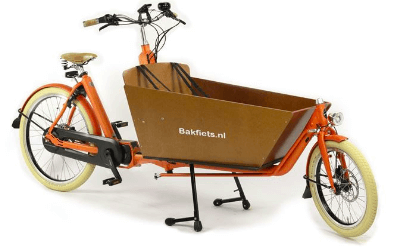
Dutch Cargo e-bikes
What is Dutch Cargo e-bike?
A Dutch cargo bike is also known as a bakfiets, which translates to “box bike” in Dutch. It is a sort of bicycle developed primarily for delivering products and freight. Dutch cargo bikes are popular in the Netherlands, where they are used for a variety of purposes, including carrying groceries and goods as well as transporting children and pets. They are well-known for their utility, adaptability, and environmental friendliness.
They are frequently used in the Netherlands, where cycling is a prominent means of transportation. Cargo e-bikes in the Netherlands often include a big cargo box or basket that may be used to transport groceries, parcels, and other stuff. Some versions provide extra luggage space on the back or front of the bike.
Dutch cargo e-bikes include an electric motor that makes cycling simpler and may also offer a boost when needed. This allows for the easy transport of huge goods over great distances. The electric support also allows the bike to be used in steep terrain, lowering the effort necessary to pedal uphill.
Dutch cargo e-bikes are not only useful, but they are also ecologically sustainable. They produce no pollution and use significantly less energy than vehicles, making them a more environmentally friendly option for individuals who need to move products. Furthermore, because they are bikes, they take up less parking space, are easier to maneuver in traffic, and may be used in locations where vehicles are prohibited.
What is a Dutch cargo bike called?

A Dutch cargo bike is also known as a bakfiets, which is Dutch for “box bike.” It is a sort of bicycle that is particularly built for moving products and freight. Dutch cargo bikes are popular in the Netherlands, where they are used for a variety of jobs ranging from carrying groceries and packages to transporting children and pets. They are well-known for their functionality, adaptability, and environmental friendliness.
What is special about Dutch cargo bikes?
Dutch cargo bikes, or bakfietsen, are unique for various reasons:
Design:
Dutch cargo bikes are intended to be very functional and adaptable. They have a huge cargo box or basket at the front of the bike that makes transporting products and parcels simple. The cargo box is generally usually low to the ground, which improves balance and stability when hauling big loads.
Sustainability:
Cargo bikes in the Netherlands are ecologically benign since they generate no emissions and consume significantly less energy than vehicles. They are a sustainable option for individuals who need to move products and can assist to reduce the number of automobiles on the road, resulting in reduced traffic and better air quality.
Convenience:
Even in busy regions, Dutch cargo bikes are easy to maneuver. They are also more adaptable than automobiles since they may be utilized in locations where automobiles are not permitted, such as pedestrian zones and bike routes. Furthermore, they demand less parking space, making it easier to locate a location to put your bike.
Health Advantages:
Cycling is beneficial to one’s health, and riding a Dutch cargo bike can bring extra advantages such as enhanced cardiovascular health and greater strength and endurance.
Style:
Dutch cargo bikes are not only functional, but also fashionable. They can make a statement everywhere they go because to their unusual style, and they have become a symbol of Dutch riding culture.
Overall, Dutch cargo bikes are unique in that they give a practical, ecologically sustainable, and fashionable means of transporting products and freight. They’ve become an indispensable element of the Dutch transportation system, and they’re used for everything from carrying groceries to transporting children and dogs.
Is it difficult to ride a bakfiets?
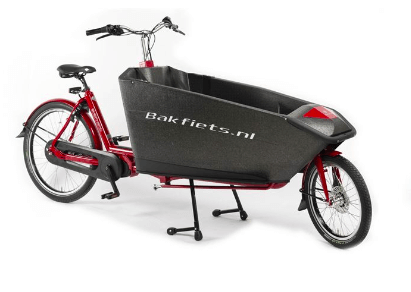
Riding a bakfiets, a sort of cargo bike common in various European nations, is a unique experience that is not always challenging. The amount of difficulty varies based on things such as your cycling expertise, the kind of bakfiets you are riding, the weight of the load you are carrying, and the terrain you want to ride on.
Furthermore, most bakfiets come with a cargo box or basket, making it easier to transport products and parcels. When opposed to a bike with a rear-mounted basket, the luggage box is often situated towards the front of the bike, which can give superior balance and stability.
Are Dutch cargo bikes powered by electricity?
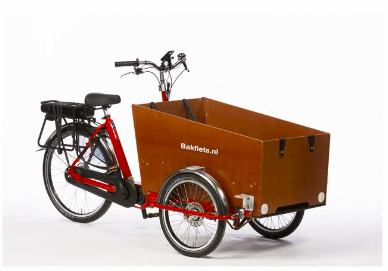
Yes, some Dutch cargo bikes do have electric engines. Electric Dutch cargo bikes, also known as e-bakfiets, are becoming increasingly popular because they aid cyclists, making it simpler to haul goods and luggage, particularly uphill. The rider may regulate the electric motor using a throttle or pedal assist, which detects the rider’s pedaling effort and offers a boost when necessary.
The installation of an electric motor can increase the versatility and practicality of a Dutch cargo bike, allowing it to be utilized for a wider range of activities and in a wider range of situations. An e-bakfiets, for example, may be used to move big cargo over longer distances or over hills.
Overall, the availability of electric Dutch cargo bikes has improved their appeal and made them more accessible to a larger spectrum of users. An electric Dutch cargo bike may be the ideal answer whether you need to haul products and freight or simply want to make cycling simpler.
9 Best Dutch Cargo e-bikes to buy in 2023?
There are several kinds of Dutch cargo e-bikes available, and the ideal one for you will be determined by your own needs and tastes.
Here are several common models, along with their advantages and disadvantages:
1- The Babboe Curve:
This is a traditional Dutch-style cargo bike known for its stability and ease of use. It has a spacious cargo box in front, a comfy passenger seat, and a strong electric motor.
Pros:
Stable and simple to use, ideal for transporting children and big cargo, with comfortable seats.
Cons:
When compared to other models, it can be heavy and difficult to control, and it has a restricted speed and range.
2- Urban Arrow Family:
This is a sleek and attractive Dutch cargo bike made for city use. It has a small frame, a strong electric engine, and a large cargo compartment that can hold up to two children.
Pros:
Sleek and modern design, compact and simple to handle, suitable for transporting children and small goods.
Cons:
Restricted carrying capacity in comparison to other versions; can be costly.
3- Spicy Yuba Curry:
This is a tough and adaptable Dutch cargo bike built for heavy-duty use. It has a wide cargo box at the front, a strong electric motor, and a strong structure that can withstand high loads.
Pros: tough and sturdy, suitable for transporting hefty goods, large carrying capacity.
Cons:
When compared to other models, it can be heavy and difficult to control, and it has a restricted speed and range.
4- Packster Riese & Muller:
This is a high-quality Dutch cargo bike with a focus on adaptability and practicality. It has a huge cargo box in front, a strong electric motor, and a variety of personalized choices and extras.
Pros:
flexible and adaptable, capable of transporting huge loads, and with a high speed and range.
Cons:
can be costly, heavy and difficult to manage, and has restricted visibility when compared to other types.
5- R&M Load 60:
This is a commercial cargo bike with a large carrying capacity. It has a huge cargo box, a strong electric motor, and a strong structure that can withstand high loads.
Pros:
High carrying capacity, suitable for commercial application, and capable of hauling huge loads.
Cons:
When compared to other types, it can be pricey, heavy, and difficult to control, with limited speed and range.
6- GSD Terns:
This is a small and adaptable cargo bike built for city use. It has a small frame, a strong electric engine, and a large cargo compartment that can hold up to two children.
Pros:
Compact and simple to maneuver, ideal for transporting children and light items, with a high speed and range.
Cons:
Limited carrying capacity in comparison to other models, which might be costly.
7- WorkCycle Fr8: Butchers & Bicycles
This is a traditional Dutch-style cargo bike intended for commercial usage. It has a huge luggage box, a strong electric motor, and a comfortable rider seat.
Pros: sturdy and simple to operate, capable of transporting huge loads, and comfortable seats.
Cons:
In comparison to other versions, it is heavy and difficult to control, and it has a restricted speed and range.
8- Edgerunner by Xtracycle:
This is a multipurpose cargo bike that may be used for a variety of purposes. It has a large load rack, a strong electric motor, and a variety of personalized choices and extras.
Pros: adaptable and configurable, capable of hauling huge loads, fast and long range.
Cons:
When compared to other versions, it can be pricey, hefty, and difficult to manage. It also has restricted sight.
9- Cabbie Gazelle:
This is a traditional Dutch-style cargo bike intended for family usage. It has a spacious cargo box, a comfy passenger seat, and a strong electric motor.
Pros:
Stable and simple to use, ideal for transporting children and big cargo, with comfortable seats.
Cons:
In comparison to other versions, it is heavy and difficult to control, and it has a restricted speed and range.
These are just a few of the many various kinds of Dutch cargo e-bikes on the market, and the ideal one for you will be determined by your personal needs and tastes. Consider your budget, the sorts of products and cargo you will be transporting, the terrain you will be cycling on, and the distance you will be traveling before selecting the model that best matches your demands.
What is the cost of a Dutch cargo ebike?
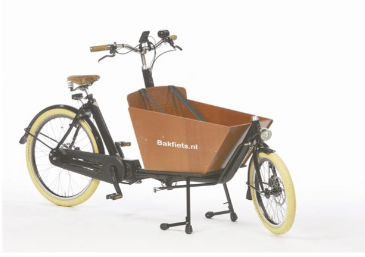
The cost of a Dutch cargo e-bike varies greatly based on numerous criteria, including the brand, model, amenities, and quality. A high-quality cargo e-bike can cost you somewhere between $3,000 and $8,000 or more. Some of the most costly versions may cost well over $10,000.
Although cargo e-bikes are more expensive initially than ordinary bicycles, they may give considerable long-term savings in terms of transportation expenditures, especially if used for commuting or doing errands. Furthermore, cargo e-bikes can help you lower your carbon impact and reliance on fossil fuels.
What is the top speed of a Dutch cargo ebike?
The top speed of a Dutch cargo e-bike can vary greatly based on a number of parameters, including brand, model, electric motor power, and rider weight. Most cargo e-bikes have a top speed of 20-28 miles per hour (mph), while some versions may reach 45 km/h (28 mph) or more.
It is crucial to remember that the maximum speed of a freight e-bike is normally restricted by legislation, and various nations may have different restrictions regulating e-bike maximum speeds.
In the European Union, for example, e-bikes are divided into two categories based on their top speed: those with a top speed of less than 25 km/h (15.5 mph) are classified as pedelecs and are subject to different regulations than those with a top speed of more than 25 km/h (15.5 mph), which are classified as light electric vehicles. In the United States, the top speed of an e-bike is usually limited to 20 miles per hour.
What type of battery does a Dutch bike use?
Dutch cargo e-bikes generally employ lithium-ion (Li-ion) batteries, which are largely acknowledged as the most efficient and dependable form of e-bike battery. Li-ion batteries are small, lightweight, and have a high energy density, making them perfect for use in e-bikes.
The Li-ion battery used in a Dutch freight e-bike varies based on the manufacturer and model. 18650 cells, 26650 cells, and 37V batteries are some of the most prevalent types of Li-ion batteries used in e-bikes. The battery’s capacity, measured in kilowatt-hours (kWh), can also vary significantly, with bigger batteries providing more range and smaller batteries being lighter and more compact.
When selecting a Dutch cargo e-bike, examine the battery life and range, since these factors might affect the bike’s utility and total cost. Some e-bike batteries can survive thousands of cycles, while others may have a lower battery life. Furthermore, the range of the bike can be influenced by a variety of circumstances, including the rider’s weight, the terrain, and the quantity of goods carried.
Related post
- Best Surface 604 e bikes Reviews. Hunting Surface 604 Cargo e-bikes for 2023.
- How to Revive a dead E-Bike Battery. Do Ebikes work with a dead battery?
- How do I choose a cargo e-bike? 2023 Buyers Guide.
- Advantages and Disadvantages of Cargo Electric bikes. What you should know.
- How to make front cargo bike. What exactly is a front cargo bike and how do they work?


